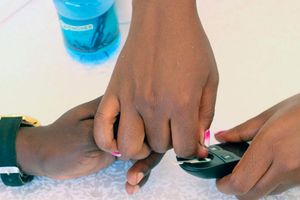Kenya’s fight against diabetes handed a Sh1bn boost

A doctor checking a patient's sugar level. According to Ministry of Health 8 out of 10 Kenyans are not aware about their blood sugar status.
What you need to know:
- Ministry of Health says over 87 per cent of Kenyans are not aware of their blood sugar status.
- In Homa Bay, many are suffering due to a lack of access to drugs and poverty.
About 750,000 Kenyans with the condition are not on treatment due to high costs and lack of access.
Kenya has received a Sh1 billion grant from the World Diabetes Foundation to boost the fight against the non-communicable disease for the next four years.
More than 2.1 million Kenyans are suffering from diabetes, with only 40 per cent on treatment.
Health Cabinet Secretary Susan Nakhumicha said about 750,000 Kenyans with the condition are not on treatment due to high costs and lack of access.
The CS added that the ministry was concerned that over 87 per cent of Kenyans are not aware about their blood sugar status.
She made the remarks in Iten, Elgeyo Marakwet County, on Wednesday during celebrations to mark the World Diabetes Day and launch of 2,006 community health promoters in the county.
She was accompanied by acting Health Director-General Patrick Amoth and Governor Wisley Rotich. The CS said that government was banking on community health promoters to conduct screening at the community level and refer the patients to health facilities for treatment.
She added that the country will have over 315 primary care networks as the government seeks to provide universal health coverage to all Kenyans.
Six centres of excellence are already up and running, Ms Nakhumicha said, to act as regional hubs for comprehensive care and diabetes research.
Over 4,000 children and adolescents living with diabetes, Ms Nakhunicha added, are provided with insulin and other health services free of charge. She challenged Kenyans to exercise regularly and lead a healthy lifestyle to lower the disease burden.
“Everyone is encouraged to exercise and eat healthy meals with less refined sugar and fats and plenty of fruits. We also need to stop smoking and binge drinking,” said the CS.
On his part, Governor Rotich said the county had stepped up surveillance of non-communicable diseases in the devolved unit.
“We are very concerned that, for every 1,000 people, 14 have diabetes,” he said.
And in Homa Bay County, many diabetes patients are suffering in silence due to lack of access to drugs and poverty.
Patients who spoke to Nation on Wednesday said they have been struggling to get drugs because the county government has not sufficiently invested in the management of the disease.
Most patients suffering from diabetes and other non-communicable diseases from vulnerable families have been relying on the charity of organisations such as the Médecins Sans Frontières (MSF), which has been operating in the county for over 20 years.
It is involved in the management of HIV, diabetes, hypertension and asthma.
MSF Project Coordinator Bright Mukhuna said most lower level health facilities do not offer services for non-communicable diseases yet they are the most-frequented by the poor.
Most patients are often referred to the Homa Bay County Teaching and Referral Hospital when their condition has already worsened.
“We operate in some wards and have a post-discharge clinic at the referral hospital where we stabilise patients,” Dr Mukhuna said, adding that a lot of patients in wards at the county referral hospital are suffering from non-communicable diseases.
Dr Mukhuna called on the county government to put greater effort in managing diabetes.
He said the disease presents a lot of social challenges, including draining family coffers due to expensive drugs.
“ If the disease is not well managed, patients are not able to contribute to the development of the country,” Dr Mukhuna said. MSF gives patients drugs for free at Nyalkinyi and Marindi hospitals where they have been flocking in droves.
The free drugs programme is being run in partnership with the county government.
County Non-Communicable Diseases Coordinator Silas Mado said the diabetes prevalence in the county was high and expressed concerns over the unavailability of drugs.
He said the county government will use community health promoters to identify patients and refer them to their nearest health facilities.
“Community health promoters have been given comprehensive medical kits, which they will use to diagnose different diseases, including diabetes, before referring patients,” Mr Mado said.
It costs about Sh5,000 per month to manage diabetes, an amount that is out of reach for most low-income families.
Patients lamented that their lives are at stake due to difficulties in getting drugs used for managing the condition.
Ms Millicent Odhiambo, who was diagnosed with the disease in 2018, told Nation that, although she gets drugs free of charge, she struggles to get enough food to stay healthy.
“Most patients spend a lot of money on transport to access drugs. The medicine should be made readily available in local dispensaries,” she said.






